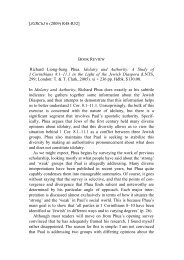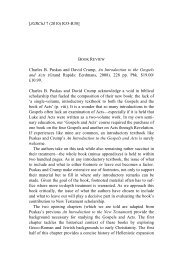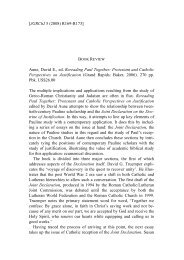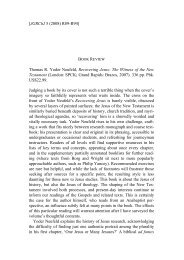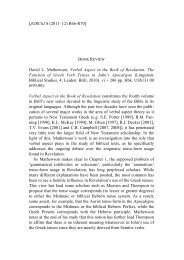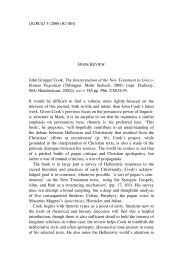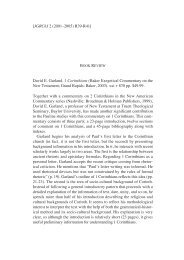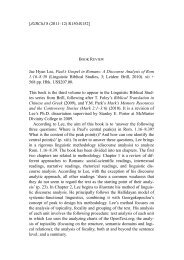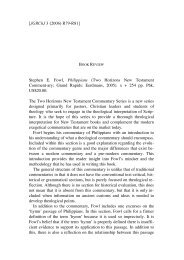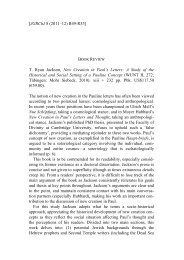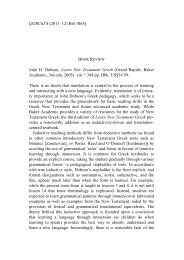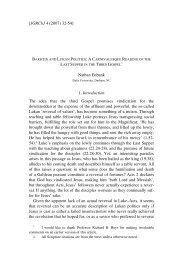The Politics of Ephesians and the Empire - Journal of Greco-Roman ...
The Politics of Ephesians and the Empire - Journal of Greco-Roman ...
The Politics of Ephesians and the Empire - Journal of Greco-Roman ...
You also want an ePaper? Increase the reach of your titles
YUMPU automatically turns print PDFs into web optimized ePapers that Google loves.
Gupta & Long <strong>Politics</strong> <strong>of</strong> <strong>Ephesians</strong> <strong>and</strong> <strong>the</strong> <strong>Empire</strong> 123<br />
<strong>of</strong> <strong>the</strong> empire. 40 Augustus strategically identified himself with Jupiter, 41<br />
<strong>and</strong> after his death this continued such that his temple <strong>and</strong> statue within<br />
were designed after <strong>the</strong> temple <strong>of</strong> Jupiter Capitolinus. 42<br />
Thus, when <strong>the</strong>se points are all taken toge<strong>the</strong>r, <strong>the</strong> Gentile audience(s)<br />
would have been well acquainted with Jupiter-Zeus <strong>and</strong> <strong>the</strong> emperors’<br />
co-identification, <strong>and</strong> thus would have recognized <strong>the</strong> somewhat veiled<br />
reference in Eph. 2.2 as referring to <strong>the</strong> ruling emperor behind which was<br />
a spiritual force <strong>of</strong> evil, whom Jews <strong>and</strong> Christians elsewhere identified<br />
with Satan or <strong>the</strong> devil. This kind <strong>of</strong> ideological move in <strong>Ephesians</strong><br />
accords with resistance tactics, <strong>and</strong> has great similarities with Jewish<br />
resistance to Rome as seen in Qumran’s War Scroll, which employs<br />
labels <strong>and</strong> coded language <strong>of</strong> ‘sons <strong>of</strong> darkness’, Kittim (= <strong>Roman</strong>s) <strong>and</strong><br />
Belial (Satan//Jupiter?) (1QM 1.1, 6, 12-13; cf. 1QS 1.10, 22-24). 43<br />
<strong>The</strong> third passage referring to rulers <strong>and</strong> authority is Eph. 3.10,<br />
which speaks <strong>of</strong> ‘God’s manifold wisdom being made known through<br />
<strong>the</strong> church assembly to <strong>the</strong> rulers <strong>and</strong> to <strong>the</strong> authorities in <strong>the</strong> heavenly<br />
realms’ (i3na gnwrisqh=| nu=n tai=j a)rxai=j kai\ tai=j e0cousi/aij e0n toi=j<br />
e0pourani/oij dia_ th=j e0kklhsi/aj h9 polupoi/kiloj s<strong>of</strong>i/a tou= qeou=).<br />
Careful attention to <strong>the</strong> Greek grammar reveals that two distinct entities<br />
are in view (both are articular), <strong>and</strong> thus <strong>the</strong> prepositional modifier ‘in <strong>the</strong><br />
heavenlies’ delimits only <strong>the</strong> second noun, ‘authorities’. <strong>The</strong> implication<br />
40. See Paul Zanker, <strong>The</strong> Power <strong>of</strong> Images in <strong>the</strong> Age <strong>of</strong> Augustus (trans. Alan<br />
Shapiro; Jerome Lectures, 16; Ann Arbor: University <strong>of</strong> Michigan Press, 1988),<br />
pp. 230-38. See also <strong>the</strong> tracing <strong>of</strong> <strong>the</strong> numerous direct associations linking Augustus<br />
(<strong>and</strong> subsequent Caesars) to Jupiter in Duncan Fishwick, ‘On <strong>the</strong> Temple <strong>of</strong> Divus<br />
“Augustus”’, Phoenix 46 (1992), pp. 232-55.<br />
41. Richard F. Thomas, ‘Torn between Jupiter <strong>and</strong> Saturn: Ideology, Rhetoric <strong>and</strong><br />
Culture Wars in <strong>the</strong> “Aeneid”’, <strong>The</strong> Classical <strong>Journal</strong> 100.2 (2004–2005), pp. 121-<br />
47, who concludes, ‘in Greece <strong>and</strong> <strong>the</strong> East as early as <strong>the</strong> 30’s bce Augustus was<br />
suggesting for himself an identity with Jupiter. <strong>The</strong> deceptive Jupiter <strong>and</strong> <strong>the</strong> deceptive<br />
Aeneas would in <strong>the</strong> decades that followed be seen in <strong>the</strong> form <strong>of</strong> Augustus, who<br />
succeeded in perpetrating <strong>the</strong> greatest political fiction <strong>of</strong> <strong>the</strong> West, that an absolute<br />
monarchy was in fact a pure republic. It is my view that Virgil saw what was going<br />
on’ (p. 146). Cf. Fishwick, ‘On <strong>the</strong> Temple <strong>of</strong> Divus “Augustus”’, pp. 239-42.<br />
42. For <strong>the</strong> temple structure, see Fishwick, ‘On <strong>the</strong> Temple <strong>of</strong> Divus “Augustus”’,<br />
pp. 235-36; Fishwick very reasonably, with good evidence, argues that <strong>the</strong> cult statue<br />
imitated Jupiter.<br />
43. On <strong>the</strong> identity <strong>of</strong> <strong>the</strong> Kittim, see H.E. Del Medico, ‘L’identification des<br />
Kittim avec les Romains’, VT 10 (1960), pp. 448-53; for a detailed discussion <strong>of</strong> <strong>the</strong>se<br />
<strong>and</strong> o<strong>the</strong>r Jewish texts in relation to <strong>the</strong> specifics <strong>of</strong> Eph. 2.2-3, see Long, ‘<strong>Roman</strong><br />
Imperial Rule’.



